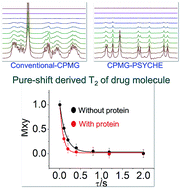Measurement of 1H NMR relaxation times in complex organic chemical systems: application of PSYCHE†
Abstract
Relaxation times provide a wealth of information on intramolecular dynamics and intermolecular interactions. However, in complex molecular systems with extensive peak overlaps in NMR spectra, relaxation time measurements are severely hampered due to difficulties in quantitation of peak intensities for individual protons. Here, we incorporate PSYCHE homodecoupling in inversion recovery and CPMG NMR experiments to significantly enhance spectral resolution, thereby enabling unambiguous measurement of relaxation times, T1 and T2, in two complex systems. This includes a specific application to study drug–protein interactions.


 Please wait while we load your content...
Please wait while we load your content...